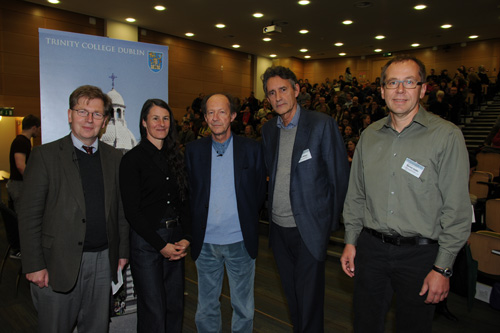World Renowned Cultural Theorist Giorgio Agamben Speaks at TCD Biopolitics Conference
Posted on: 05 November 2012
The renowned philosopher and cultural theorist from Italy, Giorgio Agamben, gave a public keynote address as part of a major three-day conference, “Biopolitics, Society and Performance” organised by the School of Drama, Film and Music and co-hosted by the Trinity Long Room Hub at Trinity College Dublin. His keynote address, “The Archaeology of the Work of Art” took place during the conference last week.
The Italian philosopher and author is widely known for his criticism of the “War on Terror” and for developing such concepts as “Homo Sacer,” someone who can be killed with impunity because he is regarded as worthless by the state, and “State of Exception,” whereby the state determines who is worthy of living. He also caused a sensation when he refused to travel to the USA to give a lecture in 2004 because of having to give up his biometric information, which he regarded as equivalent to being tattooed by the Nazis.

Juergen Barkhoff, Kira O’Reilly, Giorgio Agamben, Stephen Wilmer, Thomas Lemke.
The author was joined at the conference by other world leading participants who gave keynote addresses. They included the sociologist, Thomas Lemke from Germany, who opened the conference with his talk “Biopolitics: Current Issues and Future Challenges”, and feminist theoretician Rosi Braidotti from the Netherlands who gave a talk “What is ‘Human about the Humanities Today?'”
The conference theme of “biopolitics” addressed a major concern today about how life is being regulated, tackling such diverse topics as CCTV surveillance cameras, the rights of asylum seekers, the prevention of AIDs, environmental controls, organ transplantation, genetic modification, and stem cell research among other issues. The conference aimed to reconsider the notion of biopolitics and its recent transformations in theory and the contemporary world.
The term biopolitics was first defined by Michel Foucault in his book The Will to Knowledge. For Foucault, biopolitics means the technologies of political power that allow for the control of the human population as a biological species. Biopolitics has become a highly controversial philosophical concept today. Giorgio Agamben relates the term to the legislative aspects of power and the emergence of the totalitarian states of the twentieth century. For Agamben the inclusion of “bare life” in the political realm constitutes the original nucleus of sovereign power. Thus, the political system has the power to decide not only who deserves to have “human rights”, but also which life counts as “human” and worth living.
Many contemporary artists are concerned with the implications of biopolitics. Their work attempts to expose the control mechanisms that affect human behaviour and limit human rights, while exploring bioethical questions in relation to human tissue and genetic modification.
